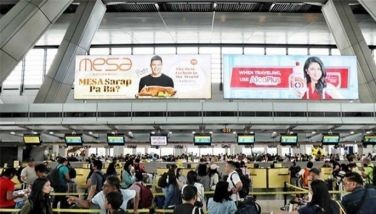Noy: We don’t need war with China
HIROSHIMA – It won’t be necessary for the Philippines to engage China in armed conflict since nations, despite their disagreements, should always work hard for peace, President Aquino said here Tuesday.
“Principle is no obstacle to peace, but war annihilates everything – including principle,†he told the crowd gathered at the Sheraton Hotel here for the Japan International Cooperation Agency-sponsored event, the Consolidation for Peace for Mindanao.
Although he did not specifically mention China, Aquino apparently referred to the Asian giant, which has been aggressively claiming almost the entire South China Sea.
“In the face of rising tensions in our region, our shared future lies in the appreciation of three basic truths,†he said.
“First, that there has to be right and wrong; second, that we have to champion what is right; and third, most crucially of all: that in championing what is right, we are always conscious that conflict is not the necessary course,†he maintained.
“I’d like to add that if solidarity among Filipinos and with other nations of goodwill, like Japan, can bring about peace, then it is incumbent on all nations to look at our regional circumstances and ask of themselves if conflict should be considered inevitable,†he said.
“While it is undeniable that tensions do exist in our part of the world, and that it can even be said that we have entered into an era of brinksmanship, all of us have it in ourselves not to be prisoners of our past,†he added,
As stipulated in the 1987 Constitution, the Philippines renounces war as a matter of foreign policy. But it is no secret that the Philippines’ military capability is no match to that of its neighbors, much less to China’s.
Manila is contesting Beijing’s expansive claim in the West Philippine Sea and South China Sea before an international arbitral tribunal based in The Hague. Beijing has rejected Manila’s initiative, saying it would only accept a bilateral approach to resolving the issue.
“Whenever it seems that the path to peace is filled with so many obstacles, when our spirits are tested and our faith in the processes is shaken, those of us who are in a position to make decisions must remember what happened here in Hiroshima, in Nagasaki, and in the many places that have faced and are now experiencing conflict: If we falter, it is the innocent who will pay the ultimate price,†Aquino said.
“If lives were needlessly sacrificed to achieve power and prestige, is it not our obligation not only to the present and future generations, but to millions of innocent dead cut down by conflict, to firmly insist that losing any life is a price none of us can afford to pay?â€
Shared commitment
Upon his arrival in Manila yesterday, Aquino announced his shared commitment with Japanese Prime Minister Shinzo Abe to explore the possibility of greater security cooperation as well as to help find ways to ease tension in the region.
Aquino said in his arrival speech that he had discussed with Abe all aspects of the two countries’ strategic partnership and how such partnership could be improved in the face of challenges facing both Manila and Tokyo.
Aquino said Abe reiterated his support for peaceful resolution of maritime issues.
“Our goal: De-escalate tension through reasonable and comprehensive means on three levels – immediate, intermediate and final approaches. This is what the country laid down,†Aquino said.
In the meantime, provocative actions in the disputed waters should be avoided, he said.
Japan is also engaged in a dispute with China over the Senkaku islands in the East China Sea.
Aquino said the Philippines is determined to push for the implementation of the Declaration on the Conduct of Parties in the South China Sea (DOC) as well as the completion of a legally binding Code of Conduct (COC).
The DOC calls on parties involved in maritime disputes to exercise self-restraint and avoid actions like “inhabiting the presently uninhabited islands, reefs, shoals, cays, and other features.â€
The DOC also calls on parties to handle their differences “in a constructive manner.â€
“For the final approach, we believe that arbitration can clarify maritime entitlements of all parties that could be the strong basis to resolve maritime disputes for the sake of everybody,†Aquino said.
Robust exchange
For the Department of National Defense, an enhanced cooperation can lead to “more robust exchange†of capabilities and technologies.
“Relationships with countries that are peace-loving are crucial at this point in ensuring freedom of navigation and adherence to international law,†DND spokesman Peter Galvez said in a phone interview.
“At this time, we need to increase cooperation with these countries,†he said when asked to comment on the Philippines’ and Japan’s commitment to boost their security cooperation.With Aurea Calica, Alexis Romero, Ding Cervantes
- Latest
- Trending




























